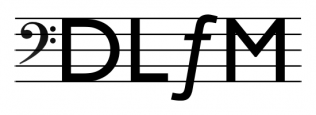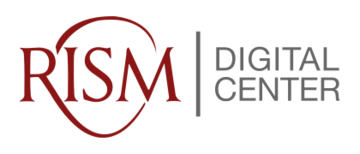9th International Conference on Digital Libraries for Musicology
In association with the annual conference of the International Association of Music Libraries (IAML), 28 July 2022
The Digital Libraries for Musicology (DLfM) conference is the premiere venue for scholars engaging with digital libraries in the domain of music and musicology. It provides a forum for musicians, musicologists, librarians, and technologists to share findings and expertise.
PROGRAMME
The DLfM 2022 preliminary schedule can now be found here: https://dlfm.web.ox.ac.uk/2022-programme
LOCATION, COLLABORATION
In 2021 we had a successful and productive first collaboration with the International Association of Music Libraries (IAML), although the pandemic forced us to hold this online and thus miss out on the ‘full experience’. That being the case, like many conferences, we are aiming to use 2022 to run the ‘real’ version of what we had planned for 2021. We are thus delighted to remain with IAML for a second year in the hope that we can benefit from a full, in-person conference this time.
DLfM 2022 will take place on 28 July 2022, at the Municipal Library in Prague, within the wider IAML conference (https://www.iaml.info/congresses/2022-prague). The provisional programme is as follows (times TBC):
- Thursday 28th: Joint DLfM-IAML poster and paper session/s.
- Thursday 28th: DLfM-only paper sessions
CALL FOR PAPERS AND POSTERS
DLfM welcomes contributions related to any aspect of digital libraries and musicology, including topics related to musical archiving and retrieval, cataloguing and classification, musical databases, special collections, music encodings and representations, computational musicology, or music information retrieval (MIR).
The conference this year will welcome papers related to the 'FAIR principles' in Digital Libraries for Musicology and covering topics associated to making data - but also tools and services - findable, accessible, interoperable and reusable. In a world where technologies rapidly multiply, and where user needs and expectations as well as digital risks change extremely quickly, we consider these principles to be essential in the development of digital libraries tailored to musicology research. What tools, practices, or perspectives can help us navigate these constantly fluctuating needs and technologies while still prioritizing accessibility and sustainability?
The conference strongly encourages papers and posters that address this year's theme, however, we welcome all papers addressing all traditional topics that fall under the scope of DLfM. Specific examples of topics traditionally covered at DLfM can be found below.
Proceedings of the DLfM 2022 will be published in ACM ICPS as an Open Access publication as in previous years. Like last year, we are fortunate that in 2022 we again will be able to offer authors an open access proceedings paper without passing on the cost to authors.
IMPORTANT DATES (AoE)
- Paper (full paper and short paper) submission deadline:
Monday, March 21, 2022Monday, March 28, 2022 - Notification of paper acceptance: Monday, May 9, 2022
- Poster submission deadline: Monday, May 23, 2022
- Camera-ready submission deadline (full and short papers): Monday, June 13, 2022
- Conference registration deadline: see the IAML Conference registration webpage
- Conference: Thursday, July 28, 2022, at the Municipal Library in Prague
SUBMISSIONS
Paper submissions
- Paper length: We invite full papers (up to 8 pages excluding references) or short papers (up to 4 pages excluding references).
- Submissions: work is submitted to DLfM via EasyChair (https://easychair.org/
conferences/?conf=dlfm2022). - Format: Submissions must be in English, formatted according to the appropriate ACM template (see template below), in PDF format, and A4 size. Authors will need to follow ACM's instructions for formatting carefully. Assistance will be provided from the proceedings chair.
- Templates: Authors must use either the LaTeX template (https://www.acm.org/binaries/
content/assets/publications/ consolidated-tex-template/ acmart-primary.zip), the LaTeX + Overleaf template (https://www.overleaf.com/ gallery/tagged/acm-official#. WOuOk2e1taQ) (use the ACM Conference Proceedings template), or the MS Word template https://www.acm.org/binaries/ content/assets/publications/ word_style/interim-template- style/interim-layout.docx. Historically, LaTeX versions have been easier to process into camera-ready versions. Therefore, we encourage all authors to use the LaTeX (or LaTeX + Overleaf) template if possible. - Page limits for submitted papers apply to all text, excluding the bibliography (i.e., references can be included on pages over the specified limits).
Poster submissions
- Submission: The initial poster submission consists of an abstract which outlines both the scholarly content and broad details of the proposed layout in 500 words or fewer.
- Format: Posters will be formatted in A0 specifications. A template will be sent closer to the conference date to authors of accepted poster abstracts. All accepted posters will also be required to submit before the conference date a digital copy to be shared publicly on the conference web page.
Review and Ethics
Papers (long and short) will be double blind peer reviewed by 2-3 members of the programme committee. For accepted paper submissions, at least one author must register for the conference (as a presenter) by the conference registration deadline
DLfM conforms to the usual conventions for publication ethics. For instance, we endeavour to provide an effective double blind reviewing process that is fair to all submissions, with reviews from experts in the subject area. In turn, we expect authors to ensure anonymity in the original submission as far as practically possible, (for instance by not uploading the submission to public website and/or removing any currently public unpublished preprints while it is under review) and that submissions to DLfM are not under active consideration by another conference of journal.
Submission link and contact email
CONTINGENCY
We recognize that even in July 2022, in-person conferencing may still not be possible given the constantly changing landscape of the pandemic, and that we may have to revert to an online-format once again.
We also recognize that the pandemic has affected people unevenly, and we will consider individual situations on a case-by-case basis. For now, please simply submit your work with the assumption that at least one author will present in person. We will endeavour to work out any issues later (for instance through a limited amount of hybrid participation where possible and absolutely necessary).
BACKGROUND
While Digital Libraries have long offered facilities to provide multimedia content, the requirements of systems for library music are complex. The many forms taken by musical data, the needs for connections between these, and the importance of scholarly and historical contextual information all require special care to support meaningful engagement with the materials.
The Digital Libraries for Musicology (DLfM) conference presents a venue specifically for those working on, and with, Digital Library systems and content in the domain of music and musicology. This includes Music Digital Library systems, their application and use in musicology, technologies for enhanced access and organisation of musics in Digital Libraries, bibliographic and metadata for music, intersections with music Linked Data, and the challenges of working with the multiple representations of music across large-scale digital collections such as the Internet Archive and HathiTrust.
DLfM focuses on the implications of music for Digital Libraries and Digital Libraries research, especially when pushing the boundaries of contemporary musicology through the application of techniques from more technology-oriented fora such as ISMIR and ICMC. This instalment of DLfM conference follows previous conferences in Montreal, The Hague, Paris, New York, Shanghai, Knoxville and London.
DLfM partners with IAML, ISMIR, and other conferences to encourage new collaborations and discussions surrounding prominent issues in our shared field.
CONFERENCE OBJECTIVES
- to act as a forum for reporting, presenting, evaluating and disseminating work combining technology with musicology through Digital Library systems;
- to critically evaluate the operation of Music Digital Libraries and the applications and findings that flow from them;
- to re-evaluate existing Music Digital Libraries, particularly in light of the transformative methods and applications emerging from musicology, large collections of both audio and music-related data, ‘big data’ methods, and MIR;
- to explore how digital libraries and digital musicology can combine to offer richer online access to online music collections;
- to set the agenda for work in the field to address these new challenges and opportunities.
TOPICS
Topics of interest include, but are not limited to:
- Building and managing digital music collections
- Optical music recognition
- Information literacies for Music Digital Libraries
- Data quality assessment
- Access, interfaces, and ergonomics
- Interfaces and access mechanisms for digital music content
- Identification/location of music (in all forms) in generic Digital Libraries
- Techniques for locating and accessing music in very large Digital Libraries (e.g. HathiTrust, Internet Archive)
- Mechanisms for combining multi-form music content within and between Digital Libraries and other digital resources
- User information needs and behaviour for Music Digital Libraries
- Musicological knowledge
- Music data representations, including manuscripts/scores and audio
- Applied MIR techniques for digital music content or analysis
- Computational and systematic approaches to musicological analysis
- Extraction of musical concepts from symbolic notation and/or audio data
- Metadata and metadata schemas for music
- Application of Linked Data and Semantic Web techniques to Music Digital Library content, access, or organisation
- Ontologies and categorisation of musics and music artefacts
- Improving data for musicology
- Musical corpus-building at scale
- Enriching public access to music, music-cultural, and music-ephemera material online
- Digital Libraries showcasing need or support of musicology and/or other scholarly domain
- Digital Libraries combining resources for musicology (e.g. combining audio, scores, bibliographic, geographic, ethnomusicology, performance, etc.)
CONFERENCE ORGANIZATION
Programme Chair
Laurent Pugin, RISM Digital Center / University of Bern
General Chair
Claire Arthur, Center for Music Technology, Georgia Tech
Proceedings Chair
David John Baker, University of Amsterdam
Programme Committee
Houman Behzadi, McGill University
Jorge Calvo Zaragoza, Unversity of Alicante
Rafael Caro Repetto, Institute for Ethnomusicology, Kunstuniversität Graz
Richard Chesser, British Library
Kahyun Choi, Indiana University Bloomington
Rachel Cowgill, University of York
Achille Davy-Rigaux, IReMus
Teresa Delgado, Biblioteca Nacional de España
Jürgen Diet, Bavarian State Library
Stephen Downie, University of Illinois at Urbana-Champaign
Loukia Drosopoulou, The British Library
Timothy Duguid, University of Glasgow
Ichiro Fujinaga, McGill University
Axel Teich Geertinger, Royal Danish Library
Francesca Giannetti, Rutgers University
Charles Inskip, University College London
Jose M. Iñesta, Universidad de Alicante
Frauke Jurgensen, University of Aberdeen
Kjell Lemström, University of Helsinki
Cynthia Liem, Delft University of Technology
Ewa Łukasik, Poznan University of Technology, Institute of Computing Science
Cory Mckay, Marianopolis College
Joshua Neumann, Akademie der Wissenschaften und der Literatur Mainz
Terhi Nurmikko-Fuller, Australian National University
Kevin Page, University of Oxford
David Rizo, University of Alicante
Xavier Serra, Universitat Pompeu Fabra
Sertan Şentürk, Universitat Pompeu Fabra
Marnix van Berchum, Utrecht University
Reinier de Valk, Moodagent




